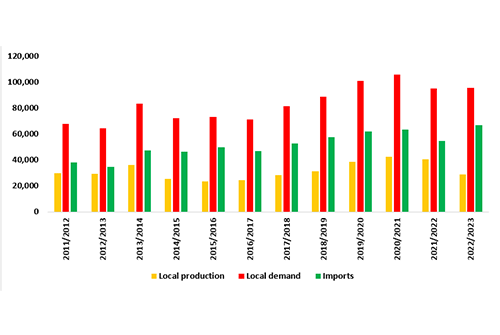Local food production is finally taking off because of policy initiatives over the years. However, Namibia is still importing most of its fruits and vegetables.
The Namibia Agronomic Board (NAB) has focused multiple efforts to assist Namibian producers in the marketing and selling of their produce locally as well as internationally.
However, NAB spokesperson Auguste Fabian said the most notable initiative is the market share promotion (MSP) scheme, which is a horticultural scheme that came into effect in 2004. “The scheme is a growth at home strategy, implemented by the NAB and aims at stimulating horticultural production in Namibia and the promotion of local sales of locally produced fresh fruits and vegetables by encouraging importers such as wholesalers, catering companies and retailers to source locally,” said Fabian.
She further explained the scheme requires importers of fresh fruits and vegetables to procure Namibian horticultural products equivalent to at least the minimum percentage factor in monetary value per quarter, as determined and approved by the NAB board, on recommendation from the National Horticulture Advisory Committee.
She stated the minimum MSP currently stands at 48% and it serves as a prerequisite to obtaining an import permit, which means that only traders or importers who have achieved their minimum MSP are allowed to import horticultural products unrestricted.
“Traders or importers that fail to comply with this requirement are restricted to only importing horticultural products equivalent to a predetermined monetary value. Initially, the MSP started at 5% in 2005. However, the intervention led to an increase in local fruit and vegetable production to the current 48%,” noted Fabian. This means that local production contributes 48% to the horticulture (fresh fruits and vegetables) domestic demand and the remaining 52% is imported mainly from South Africa, and this is from a formal trade perspective, excluding informal markets. Fabian added the MSP implementation has led to the protection of Namibian producers from cheap horticultural fresh produce imported from other countries.
To further boost the MSP scheme, the NAB introduced the horticulture special control products (SCP) scheme in 2012. The scheme allows the implementation of import restrictions on selected horticultural products during times of sufficient local production, which encourages fresh produce traders to source locally-produced horticultural products. According to her, the scheme started with only two products (potatoes and onions) in 2012 and currently, there are 17 products under this scheme namely, potatoes, onions, cabbage, butternut, tomato, carrot, sweet pepper, English cucumber, sweet potato, beetroot, gem squash, watermelon, sweet melon, pumpkin, sweet corn, lettuce (iceberg), and spinach.
Digging into the transformation made in the industry, she stated NAB has banned the importation of value-added agronomic products such as white maize meal, wheat flour and mahangu flour, to create a market for Namibian processors and employment opportunities in the country.
Namibia exports value-added products such as pasta, instant porridge and maize meal to neighbouring countries.
“The local demand for horticultural products increased from 68 017 tons in 2011/12 financial year to 111 002.5 tons in 2021/22 financial year, which can be attributed to an increase in local horticulture consumption in the country, triggered by population growth, change in consumer awareness and preferences, and shift in consumer buying power, among other factors,” added the spokesperson.
When asked how Covid-19 affected the industry, she said the supply and demand of agronomic and horticultural products have been greatly affected by the pandemic due to mobility restrictions and reduced purchasing power.
However, the availability and consumption of agronomic and horticultural products remain almost stable.
“The NAB will continue to regulate the industry to ensure that producers have access to the local and international markets. We will also assure the stakeholders that the products sold on the market are safe in terms of food safety and compliance and that the prices are not inflated,” assured Fabian.
On the other hand, she stressed Covid-19 taught Namibia a lesson concerning the reliance on imported food items. According to her, this presents an opportunity for local producers to increase production as well as an opportunity for investors to invest in agro-processing and agriculture technology to further increase food production and contribute toward food self-sufficiency.
Agriculture ministry spokesperson Jona Musheko assured local producers the ministry is committed to ensure local production of horticulture, for food security.
Hydroponics production
New Era engaged the Gobabis correctional facility hydroponic project, which was officially inaugurated in 2020, with the hope that the project will become the main vegetable supplier, especially for soup kitchens in and around the town.
Hydroponics is a type of horticulture and a subset of hydroculture, which involves growing crops, without soil, by using mineral nutrient solutions in an aqueous solvent.
Senior correctional officer Paulus Ndaumbwa stated the project has been growing with products such as kale, cucumber, green pepper, watermelon and lettuce.
“Currently, the project is able to cater to the needs of the community, it does so by selling these products to different shops and restaurants in Gobabis. These sales allow the project to sustain itself,” said Ndaumbwa.
He added the project currently supplies products to officers, Goba lodge, Omateko lodge, Mega Save, OK Express, Die Dam lodge and to individuals in the community.
“The project helped the correctional service very much. It contributes to the offenders’ diet and only sells the remaining products to the community. This allows the facility to provide a nutritious meal to its population. Initially, only three officers were trained in hydroponics, and they have trained two other officers and 32 offenders so far,” he said.
The project was supported by the World Food Programme (WFP), in collaboration with the United Nations Office on Drugs and Crime (UNODC).


